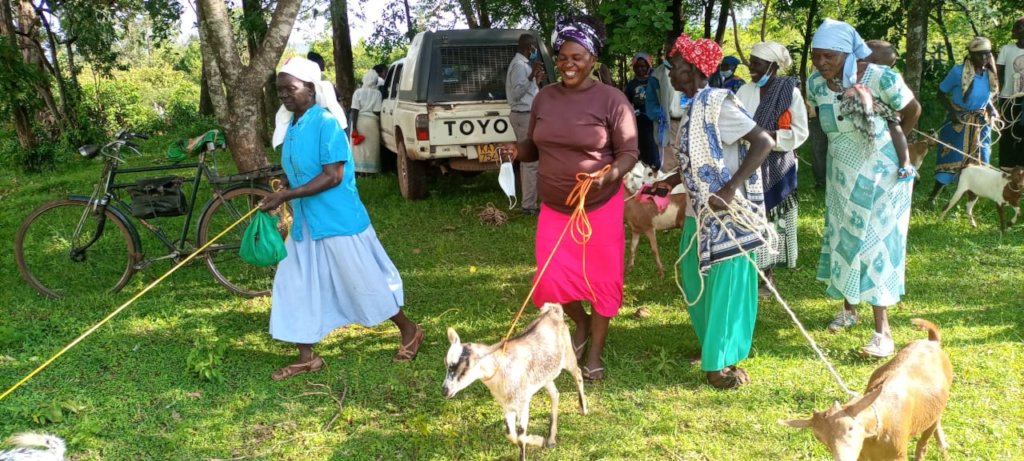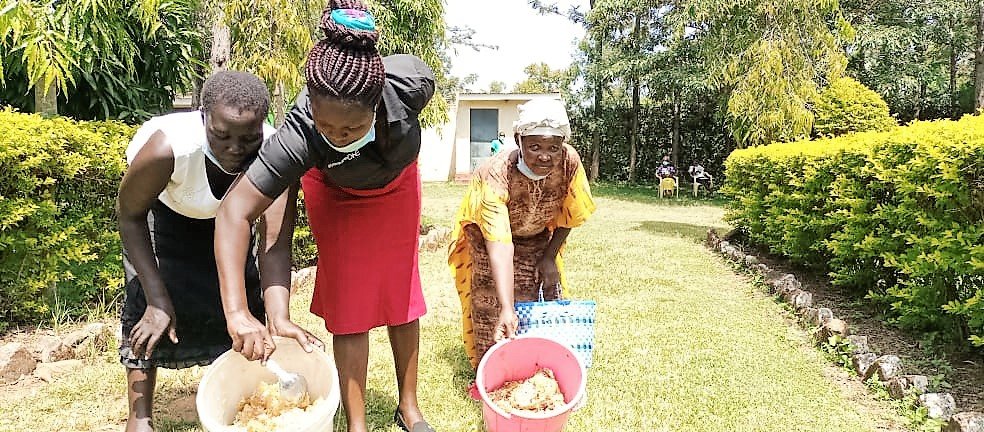By Paul Odalo | Monitoring, Evaluation & Partnership Officer
INTRODUCTION:
The Mango Tree Orphan Trust Fund-Kenya has initiated a workable ambitious initiative to boost the livelihoods of 1500 rural farmers through agribusiness. We have launched and continue to implement several agribusiness initiatives with the goal of the project fundraising being $50,000 with $15,675 realized.
The organization organized and rolled out the following activities for the latest quarter:
I. FARMING ACTIVITIES
The organization, in collaboration with registered local farmers, county and national government agricultural extension officers, and other agribusiness institutions, is undertaking several agribusiness projects in the Homabay and Migori counties. The organization executed the following specific agribusiness projects:
a) Apiculture
TMT identified beekeeping as one of the ventures that could be used to promote families, as it’s a simple but more rewarding business and can be implemented by a majority of farmers. Through beekeeping, TMT is hoping to have families with a stable income source that will help the family in terms of cash and nutritional aspect, supporting farmers to break the cycle among the caregivers by promoting apiculture.
Over the last quarter, the project focused on scaling up the number of farmers who are involved in beekeeping. The organization identified 20 new farmers who were supported with 3 hives each. Upon harvesting a 20% of the proceeds from each farmer will be saved to help them pass a gift to another farmer thus expanding the project to more farmers.
Project Milestone
Beekeeping has been progressing very well in this reporting period. From the initially distributed 40 hives, a good harvest has been realized from them. Most of the hives which were colonized immediately after installation had approximately produced 7kg per hive for the first 19 Langstroth standard hives giving about 133kgs of pure quality honey within this quarter. As it was the first impressive harvest, most of the farmers were impressed and didn’t trade the honey but decided to consume it within the household hence improving their nutrition value and medicinal impact from the pure natural honey.
Training of bee farmers
Over the reporting period, the organization conducted 2 pieces of training to 20 new farmers on beekeeping management practices and inspection. This would enable them to understand the type of business that they are involved in and also help them understand the importance of this project in boosting their income and the nutritional aspect of honey.
Placement of beehives
TMT-Kenya has managed to procure and conduct placement of 60 more Langstroth standard beehives to 20 households. The farmers were first identified and several routine pieces of training were conducted on apiary management and inspection/harvesting.
Honey processing
Basing on the previous beehives distributed, the organization has registered a good harvest over the last quarter. The harvested honeycombs are submitted to the office for processing, package, and selling. A total of 133 Kgs have been processed and sold with proceeds submitted to farmers for family use
Challenges
Way forward
b) Goat Farming
Over the years the TMT has been involved in finding sustainable ways of improving the lives of orphans and vulnerable children and their families. Ensuring that families can afford at least the basic needs for their children without selling their assets.
To achieve this, The Mango Tree has been promoting goat rearing, which has proven to be more productive and of more benefit yet simple to manage. This involves cross-breeding of the local doe with hybrid bucks (male exotic goat) to get a new resistant and fast maturing breed.
The strength of this project is in its ability to offer better returns to farmers as well as improving the nutritional aspect of the household through consumption of goats’ milk which is highly nutritious. In addition, the droppings and urine from the goats are a good source of fertilizer for farm use. It also requires less space and less labor. This makes the project most appropriate to widows and widowers in the community.
During the quarter, the project aimed at supporting 25 farmers with goats. The beneficiaries were picked from a group of widows, widowers who are also serving as caregivers to OVC. Some of them are taking care of their grandchildren while others were left after the demises of their loved husbands and wives.
Project Milestone
The Mango Tree has been implementing this project in different phases. During this reporting period, the organization was expanding on the already tested approach to farmers. This involved the identification of new farmers who had not benefited from the previous distribution in which 25 new farmers were identified and registered. The identification of farmers was also supported by the area chief to ascertain the validity of those to benefit.
Training of farmers
Upon the registration of farmers, the organization has conducted two pieces of training for farmers on the management of the goats. They were also linked to area livestock officers who will be supporting them with extension service whenever they needed it.
Distribution of fodder crop (Calliandra)
To maximize the survival of the goats in the community, the organization supported farmers by providing them with fodder trees which is a good source of food for the goats. Each farmer was given 20 seedlings of calliandra for planting. This will reduce the chances of goats destroying other trees in search of food that might lead to environmental degradation through soil erosion.
Distribution of goats
Having done the necessary preparation for the goats' reception and having done door-to-door visits for every farmer to establish the level of preparedness, the organization procured 25 goats which were then delivered to farmers. Upon delivery, they were encouraged to ensure that the goats were taken care of following the skill that they had already acquired from the previous training.
Challenges
Poverty remains a great challenge to the people. Several caregivers deserve the support but the project is not able to support everyone at once.
Way forward
For the sustainability of the project, the organization has designed a pass-on approach where the first kid of the gifted goat will be given to the organization which will then identified another needy household for the pass-on. This will ensure that many caregivers are served.
c) Tree Planting
TMT has been promoting the planting of fruit trees in the community to ensure that families get the much-needed nutritional support and a way of diversification of farming. Apart from the nutritional benefit, fruits are also a good source of income when sold. As a way of propagating this, TMT has been advocating for the growing of paw-paw, and mangoes, and avocados since it has been confirmed that they can do well in the region and fetch good income in the market.
For this financial year, the project had projected to plant 5,000 fruit trees in various farms and schools to help in boosting household nutrition and for income generation. The project aims at distributing 10000 assorted fruits trees to the farmers.
Project Milestone
Training of farmers on planting and management of mangoes
During the quarter, TMT identified 35 widow farmers who were offered basic training on the planting of mangoes. They were then supported to dig 10 holes of 1 meter square for planting. They were also taken through a pest control mechanism for better yield
Distribution of Mangoes:
The organization distributed 350 Mango tree seedlings to the 35 trained widows for planting. This was done and a follow-up has been made to ascertain the care given to the farmers. More mango seedling has been raised awaiting the onset of rains for distribution.
8000 pawpaw seedlings are ready for distribution but due to a shortage of rains, plans are underway to distribute them at the onset of short rains in August or September.
Challenges
Due to climate change, TMT farming activities have been seriously altered. Failing of the rainfall, and timing has seriously affected the normal season hence seedling remains in the seedbed for a longer period waiting for the right time to distribute.
Way forward
Currently, the organization has put in place enough seedlings waiting for the rainfall for the distribution to take place. Farmers have been trained and are already prepared for planting.
Project reports on GlobalGiving are posted directly to globalgiving.org by Project Leaders as they are completed, generally every 3-4 months. To protect the integrity of these documents, GlobalGiving does not alter them; therefore you may find some language or formatting issues.
If you donate to this project or have donated to this project, you can receive an email when this project posts a report. You can also subscribe for reports without donating.
Support this important cause by creating a personalized fundraising page.
Start a Fundraiser
